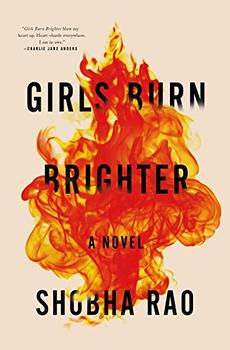Summary | Excerpt | Reading Guide | Discuss | Reviews | Beyond the Book | Readalikes | Genres & Themes | Author Bio

1
Poornima never once noticed the door of the temple. Neither did Savitha. But the temple watched them closely, perched as it was on the mountain that towered over Indravalli. The village itself was near the banks of the Krishna River, a hundred or so kilometers inland from the Bay of Bengal. Though it was situated in a level valley, the hamlet was shadowed by one of the largest mountains in Andhra Pradesh, called Indravalli Konda, with the temple halfway up its eastern face. It was painted a brilliant white and looked to Savitha like a big boll of cotton. To Poornima, the temple looked like the full moon, perpetually embraced by the sky and the branches of the surrounding trees.
Poornima was ten years old when she stood outside her family's hut, staring at the temple; she turned to her father, who was seated on the hemp-rope cot behind her, and asked, "Why did you and Amma name me after the full moon?" Her mother was sitting at the loom, working, so Poornima didn't want to bother her with the question. But she might've—she might've thought nothing at all of bothering her, of clinging to her neck, of breathing in every last trace of her scent—had she known her mother would be dead in another five years. But her father didn't even look up when she asked him. He just went on rolling his tobacco. Maybe he hadn't heard. So Poornima began again. "Nanna, why did you—"
"Is dinner ready?"
"Almost."
"How many times do I have to tell you to have it ready when I come in?"
"Was it because I was born on a full moon night?"
He shrugged. "I don't think so."
Poornima then imagined the face of a baby, and she said, "Was my face round like the moon?"
He sighed. He finally said, "Your mother had a dream, a few days after you were born. A sadhu came to her in the dream, and he said if we named you Poornima, we'd have a boy next."
Poornima looked at him as he lit his tobacco, and then she went back inside the hut. She never again asked about her name. On full moon nights, she tried her hardest to not even look up. It's just a stone, she decided, a big gray stone in the sky. But it was hard to forget, wasn't it? That conversation. It would pop up out of nowhere at times, seemingly out of nothing. While she tasted for salt in a pot of sambar, for instance, or while she served her father tea. The sadhu had been right, of course: she had three little brothers. So what was there to be sad about? Nothing, nothing at all. She even felt pride at times, and said to herself, I was their hope and I came true. Imagine not coming true. Imagine not having hope.
* * *
At fifteen, Poornima came of marriageable age, and she stopped going to the convent school. She began to sit at the spinning wheel, the charkha, in her free time to help the household. Each spool of thread she completed—the thread sometimes red, sometimes blue, sometimes silver—earned her two rupees, and this seemed like a fortune to her. And in some ways, it was: when she'd begun menstruating at the age of thirteen, she was gifted the most expensive piece of clothing she'd ever worn, a silk langa costing a hundred rupees. I can earn that in less than two months, she thought breathlessly. Besides: that she, a girl, could earn anything, anything at all, lent her such a deep and abiding feeling of importance—of worth—that she sat at the charkha every chance she got. She woke early in the morning to spin, then spun after the breakfast dishes were washed, after lunch was prepared and served, and then again after dinner. Their hut had no electricity, so her spinning was a race against the sun. Full moon nights were also bright enough to continue, but they only came around once a month. So on most nights, once the sun went down, she'd put her charkha away, look impatiently at the crescent moon or the half-moon or the gibbous moon, and complain, "Why can't you always be full?"
Excerpted from Girls Burn Brighter by Shobha Rao. Copyright © 2018 by Shobha Rao. Excerpted by permission of Flatiron Books. All rights reserved. No part of this excerpt may be reproduced or reprinted without permission in writing from the publisher.






Your guide toexceptional books
BookBrowse seeks out and recommends the best in contemporary fiction and nonfiction—books that not only engage and entertain but also deepen our understanding of ourselves and the world around us.